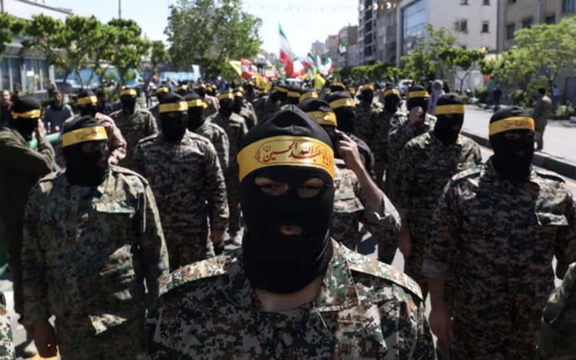US Envoy Raises Concerns Over Iran's Human Rights Abuses
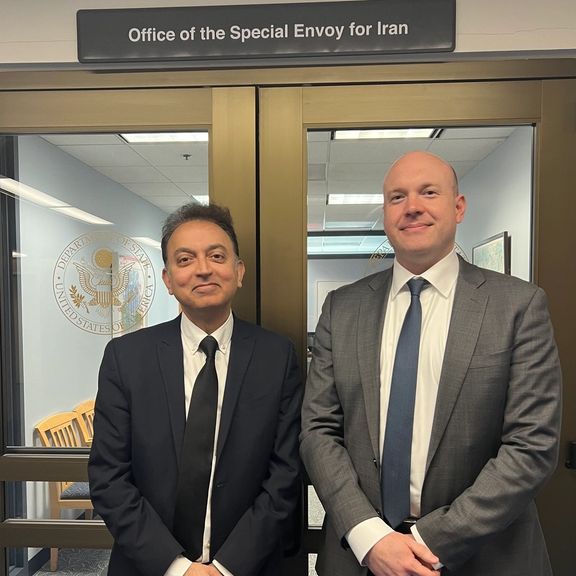
Abram Paley, US Deputy Special Envoy for Iran held a meeting and discussions with UN Special Rapporteur on Iran Javaid Rehman regarding human rights abuses in Iran.

Abram Paley, US Deputy Special Envoy for Iran held a meeting and discussions with UN Special Rapporteur on Iran Javaid Rehman regarding human rights abuses in Iran.
“Congratulated him on his mandate renewal and underscored US support for him and the Fact-Finding Mission as they continue their essential work to document the Iranian regime’s extremely concerning abuses against its own people, which they have concluded may amount to crimes against humanity,” Paley wrote on X.
Rehman assumed the role of Special Rapporteur on the situation of human rights in Iran in July 2018.
“As the international community has made resoundingly clear: Iran must grant them unhindered access to the country and provide all information necessary,” Paley added.
The United Nations' Human Rights Council extended his mission and mandate on Thursday.
The Council also resolved to continue a fact-finding mission to enable the completion of its work, "including by ensuring that the large amount of evidence of human rights violations" pertaining to the protests.
The Fact-Finding Mission (FFM) was initiated by the United Nations Human Rights Council in November 2022 amidst the Woman, Life, Freedom movement, sparked by the death of Mahsa Amini in the custody of morality police.
After 18 months of investigations, the FFM published its inaugural report on March 8, determining that the Iranian government bears responsibility for the "physical violence" leading to the demise of 22-year-old Amini in September 2022.
Iran's human rights record has long been under scrutiny, with numerous reports shedding light on various abuses perpetrated by the regime. Media censorship, internet restrictions, and the imprisonment of journalists, bloggers, and activists who voice dissent are prevalent practices.
Political activists, opposition figures, and members of minority groups often face arbitrary arrests, unfair trials, and harsh sentences. Reports of torture and ill-treatment in prisons, coupled with one of the world's highest execution rates, further underscore the gravity of the human rights situation in the country.
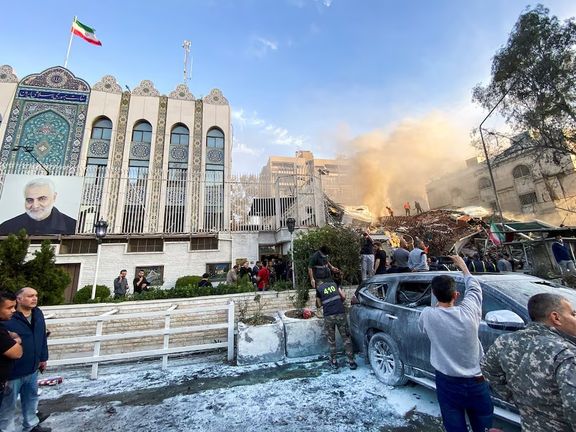
Following the recent air strike on the Iranian consulate in Damascus, several Friday Imams in Iran called on the government to exercise caution and avoid rushing into retaliatory actions against Israel.
Hassan Ameli, the representative of the Supreme Leader in Ardebil, emphasized the need for a composed response, stating, "We will not make a decision regarding revenge against Israel based on emotional impulses." He further stressed the importance of a comprehensive strategy in determining the appropriate course of action.
Lotfollah Dezhakam, representing Ali Khamenei in Fars province, echoed similar sentiments, asserting that “Israel made a mistake that it now regrets.”
Mohammad Mehdi Hosseini Hamedani, another representative of Khamenei in Alborz province, also emphasized the importance of strategic patience in the face of provocation from adversaries.
Friday Imams' statements in Iran are commonly viewed as coordinated semi-official messages provided to them by a central office under the control of Supreme Leader Ali Khamenei.
Many analysts believe that the regime's longstanding strategy of refraining from direct conflict with Israel will persist despite recent provocations. Instead, Iran is expected to continue supporting its proxies in launching attacks on Israeli and US targets.
Iran supports various proxy groups across the Middle East, including Hezbollah in Lebanon, Hamas in the Gaza Strip, and various militias in Iraq and Yemen. Through financial, military, and ideological support, Iran aims to extend its influence, counter perceived adversaries such as Israel and the United States and promote its revolutionary ideology. The proxies often serve as a means for Iran to exert pressure on regional rivals.
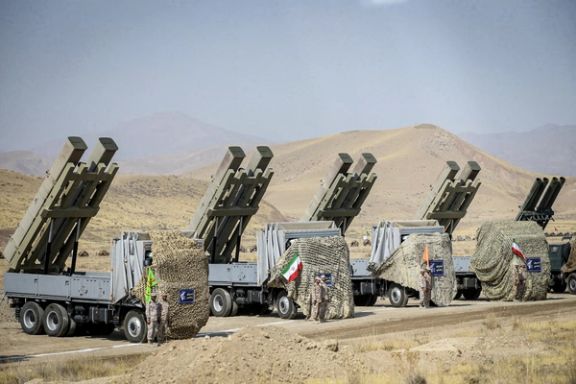
The United States is on high alert and preparing for a possible attack by Iran targeting Israeli or American assets in the region after Israel's strike on the Iranian embassy in Syria, a US official said on Friday.
"We're definitely at a high state of vigilance," the official said in confirming a CNN report that said an attack could come in the next week.
Israeli warplanes bombed Iran's embassy in Damascus on Monday in a strike that killed two Revolutionary Guard generals and five other officers and marked a major escalation in Israel's war with its regional adversaries. The Iranian commanders were reportedly involved in operations by armed militant groups Hamas and Hezbollah against Israel.
According to Iran's Islamic Revolutionary Guard Corps, General Mohammad Reza Zahedi who died in the attack was a senior commander in its Quds Force, which is an elite foreign espionage and paramilitary arm.
Iran has said it reserves the right "to take a decisive response." The head of Lebanon's armed group Hezbollah said on Friday that Israel's strike on Iran's consulate marked a "turning point" since October 7, when Palestinian group Hamas launched an attack on Israel that has led to escalating regional tensions.
US President Joe Biden discussed the threat from Iran in a phone call on Thursday with Israeli Prime Minister Benjamin Netanyahu.
"Our teams have been in regular and continuous contact since then. The United States fully supports the defense of Israel against threats from Iran," a senior Biden administration official said.
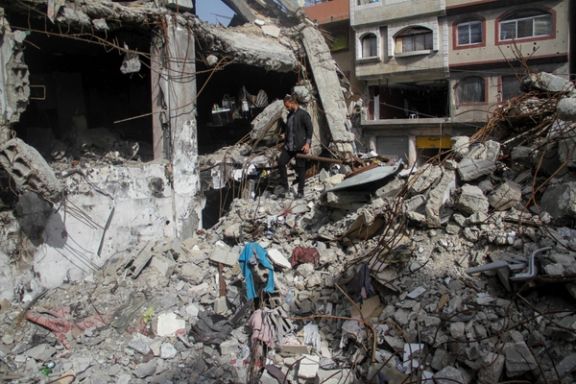
Russia has found “a good opportunity in the Gaza war,” which has overshadowed the war in Ukraine, General Yahya Rahim Safavi, the top military advisor of Iran Supreme Leader, stated on Friday.
Iran’s state media quoted Safavi as saying that Russia has been able to consolidate its hold over occupied territories since the October 7 Hamas attack on Israel that unleashed the Gaza war.
Ali Khamenei’s advisor also reiterated statements by other Islamic Republic officials that Israel is losing the Gaza war, and the United States is losing power and influence in the Middle East.
The leaders of the clerical, military government in Iran find themselves in an uncomfortable situation since April 1, when a precision Israeli air strike killed two top Revolutionary Guard generals and five other officers in Damascus. These individuals who were apparently in charge of Tehran’s war on Israel in Lebanon and Syria, were holding a meeting in one of the buildings in Iran’s embassy compound.
Although Supreme Leader Ali Khamenei and other officials vowed revenge, many experts and observers believe Iran’s rulers are reluctant to undertake actions that could precipitate a wider war with Israel. But at the same time, they could lose credibility among their domestic followers and regional proxies, if they do not launch a military response.
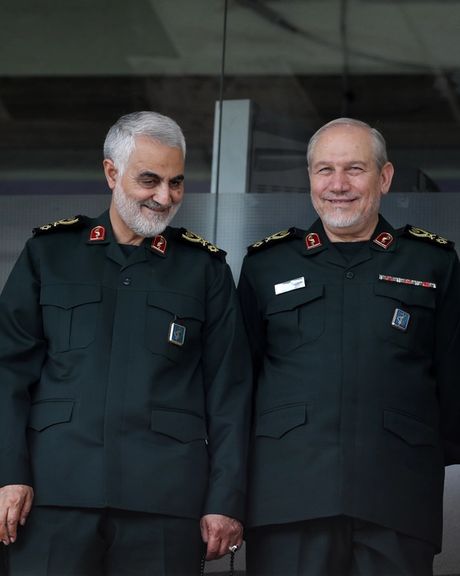
Rahim Safavi highlighted apparent rifts between the Biden administration and the Israeli government, saying that “Differences have emerged even between the US President and the Zionist regime, to the extent that the American side has told Israel that if they don’t change their policies, America will have to change its approach.”
Israeli attacks have killed 18 senior IRGC officers since December, a trend that has become difficult to explain away by the Islamic Republic.
Aftab News, an agency close to more moderate factions in Iran, highlighted the dilemma the Iranian regime faces in the wake of the Israeli strike in Syria. In an analysis on Friday, the website wrote that previous threats of retaliation after Israel killed Iranian forces never materialized.
“It seems that a series of Israeli attacks on individuals and interests of the Islamic Republic, and the failure to fulfil the promise of ‘hard revenge,’ have increased dissatisfaction among its own forces. This dissatisfaction recently reached a peak with Israel's attack on the Iranian consulate in Damascus, leading to calls for a ‘decisive and swift response’ from various political spectra, especially the Revolutionary Guards,” Aftab News said.
However, numerous commentators in Tehran, who are allowed to speak to the government-controlled media, have urged a measured reaction to Israel's Monday attack, cautioning that the strike could be a ploy to draw Iran into direct conflict.
Others in Tehran argue that if the Islamic Republic fails to show a forceful response, Israel will become more emboldened and increase the intensity of its attacks. Mohammad Sadeq Kooshki is a professor in Tehran University who told Etemad News that if in the past 30 years Iran had shown reacted forcefully to Israeli provocations, today, it would be safer from attacks.
The Iranian regime is not just vulnerable because of Israeli strikes, but it has lost popularity among the majority of the people who have suffered from runaway inflation and overall economic regression. The danger of fresh unrest is ever present following repeated nationwide protests since 2017.
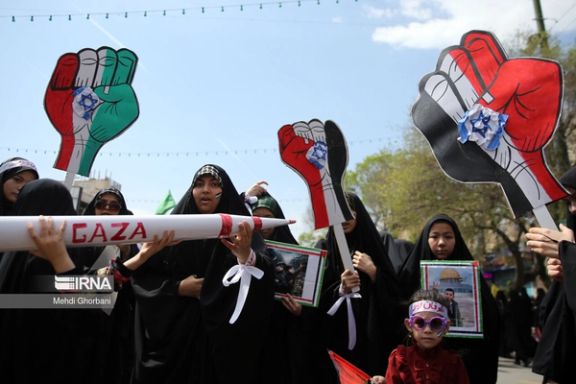
Iranians are expressing growing discontent with the government's annual Quds Day rallies, with many viewing them as irrelevant to their daily struggles and detrimental to regional peace.
Messages sent to Iran International revealed a deep disconnect between the state-sponsored event and public sentiment. These messages paint a clear picture: Iranians are increasingly critical of government-sponsored annual Quds (Jerusalem) Day rallies, viewing them as irrelevant and hypocritical distractions from pressing domestic issues.
A veteran of the Iran-Iraq war questioned the government's priorities. "Why there is no day of recognition for Sistan-Baluchestan, Kerman, Bam, or other neglected parts of Iran?" he asked, highlighting the government's lack of interest in the plight of the residents of the most deprived Iranian cities.
Disillusionment with the regime's narrative was evident in almost all the messages. A citizen condemned the government's purported concern for Palestinians as "hypocrisy and deceit," stating, "People no longer accept either the Islamic Republic or its Quds Day."
Political commentator Ali-Hossein Ghazizadeh criticized the Quds Day ceremony on Iran International, stating, "The ceremony lacks any representation of Iranian national symbols. The music played during the event is entirely Arabic and focuses on Jerusalem. It fails to connect with the Iranian people."
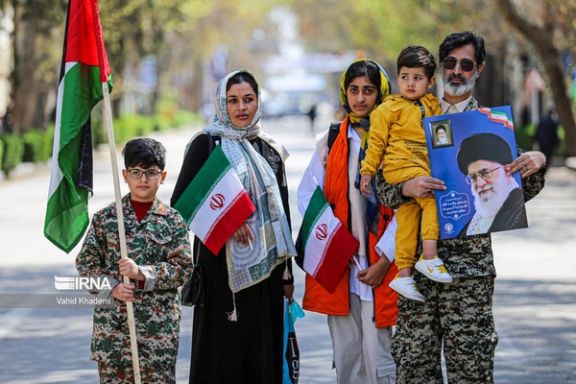
The declining popularity of the rallies was also noted. Another viewer emphasized that over the past four decades, public participation in such government-led ceremonies has waned, with little sign of ordinary Iranians or those unaffiliated with the ruling apparatus attending such gatherings.
Some people pointed out the disparity between the government's emphasis on these ceremonies and its approach to Iran's domestic issues, with many criticizing its focus on its regional policies while neglecting domestic problems.
One Iranian called Quds Day "a glossy cover-up for domestic corruption," while another stated that "These ceremonies and their promises of financial aid to the people in Gaza are a smokescreen for large-scale theft by government officials."
The metaphors used by some people were particularly striking. Using a Persian proverb that is the equivalent of “being more Catholic than the Pope,” one criticized the regime’s extravagant ceremonies for Quds Day in an audio message. While another linked Quds Day’s origins to the establishment of the Islamic Republic, implying its association with "the destruction and misery of the Iranian people." Directed against Israel’s existence, Al-Quds Day was proclaimed by the founder of the Islamic Republic Ruhollah Khomeini on August 7, 1979, a few months after the establishment of the Islamic Republic.
Another message went further, arguing that the Islamic Republic's regional policies not only fail to help Palestinians or achieve "Palestinian independence," but actually worsen their situation. A citizen stated it bluntly: "The Islamic Republic's meddling has left Palestinians and Lebanese helpless. Despite this government's rhetoric, where in the region do we see peace?"
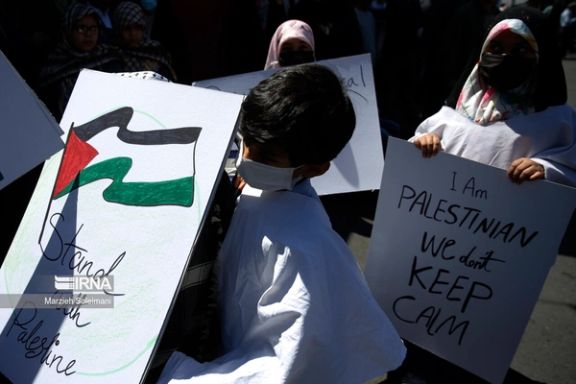
This sentiment was echoed by another who viewed Quds Day as a day of "betrayal of peace and friendship in the region" which only contributes to the Islamic Republic's "warmongering approach." They argued that since the Islamic Republic's rise to power, the region has seen only the discord.
One message highlighted the contrasting approach of the Abraham Accords, through which Israel is pursuing peaceful relations with Arab countries. The message noted that before the recent escalation ignited by Hamas's invasion of Israel on October 7, normalization talks between Israel and Saudi Arabia were nearing completion.
The recurring theme in people’s messages was comparing the Quds Day rallies to a "carnival" masking a destructive reality: The Islamic Republic keeps proclaiming its desire to eradicate Israel from the face of the earth but prioritizes turning Iranians into "sacrificial lambs" rather than directly confronting its archnemesis.
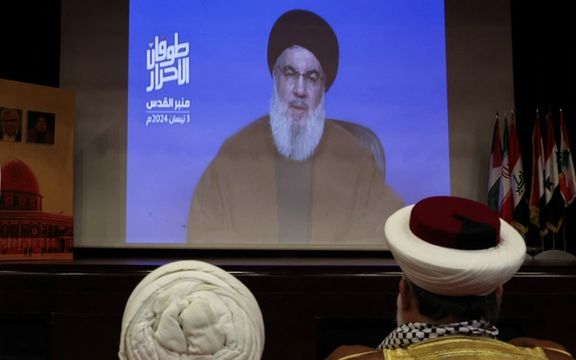
The leader of Iran-backed Hezbollah of Lebanon voiced support for Iran's right to "punish" Israel over its Monday strike on Iran's consulate in the Syrian capital, saying the response was coming.
Hassan Nasrallah called the Damascus strike on Monday a "turning point" since October 7, when Palestinian group Hamas -- another Iran-backed militia -- launched an attack on Israel, killed 1,200 mostly civilians and took 240 hostages, igniting the Middle East current conflict.
The strike killed seven members of Iran's Revolutionary Guards Corps, among them a senior commander of the Quds Force, Brigadier General Mohammad Reza Zahedi. Iran has vowed a “harsh revenge.”
"Be certain, be sure, that the Iranian response to the targeting of the consulate in Damascus is definitely coming against Israel," he said.
Israel has braced itself for the possibility of a retaliatory attack, cancelling leave for all combat units and mobilizing more troops for air defense units.
Speaking to Israeli forces at an air base on Friday, Defense Minister Yoav Gallant said Israel was attacking enemies wherever it decided to do so. "It could be in Damascus and it could be in Beirut," he said. "The enemy is badly hit in all places and is therefore looking for ways to respond. We are ready with a multi-layered defense."
Up until now, Tehran has cautiously steered clear of direct confrontation with Israel while supporting attacks on Israeli and US targets by its proxy forces across the region in Lebanon, Syria, Yemen and Iraq.
Veteran Israeli experts suggest that Iran is unlikely to retaliate directly against Israel for the attack. Diplomats and analysts suggest that Iran's clerical elite, wary of jeopardizing its hold on power, avoids seeking an all-out conflict with Israel or the US. Instead, Tehran would prefer to keep using its proxies to carry out selective tactical attacks on its archfoes.
